Cycloastragenol
Modify Date: 2025-08-23 08:58:44
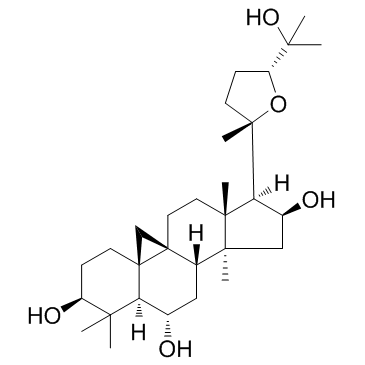
Cycloastragenol structure
|
Common Name | Cycloastragenol | ||
|---|---|---|---|---|
| CAS Number | 84605-18-5 | Molecular Weight | 490.715 | |
| Density | 1.2±0.1 g/cm3 | Boiling Point | 617.2±55.0 °C at 760 mmHg | |
| Molecular Formula | C30H50O5 | Melting Point | N/A | |
| MSDS | USA | Flash Point | 327.1±31.5 °C | |
Use of CycloastragenolCycloastragenol, a natural tetracyclic triterpenoid, was first identified when screening Astragalus membranaceus extracts for active ingredients with antiaging properties. IC50 value:Target:In vitro: In the study of Cycloastragenolon the treatment of degenerative diseases, the result showed that first-pass intestinal metabolism of cycloastragenol might occur upon passage through the intestinal epithelium. Cycloastragenol underwent extensive metabolism in rat and human liver microsomes with only 17.4% and 8.2%, respectively, of the starting amount of Cycloastragenol remaining after 30 min of incubation [1]. The present study demonstrates that cycloastragenol stimulates telomerase activity and cell proliferation in human neonatal keratinocytes. In particular, cycloastragenol promotes scratch wound closure of human neonatal keratinocyte monolayers in vitro [3]. In vivo: Rats were treated with Cycloastragenol (40 mg·kg- 1·d- 1) for 7 days to induce hepatic microsomal enzyme. The result showed that compared with the control, cycloastragenol obviously activated CYP2E1, and remarkably inhibited CYP3A4 [2]. |
| Name | cycloastragenol |
|---|---|
| Synonym | More Synonyms |
| Description | Cycloastragenol, a natural tetracyclic triterpenoid, was first identified when screening Astragalus membranaceus extracts for active ingredients with antiaging properties. IC50 value:Target:In vitro: In the study of Cycloastragenolon the treatment of degenerative diseases, the result showed that first-pass intestinal metabolism of cycloastragenol might occur upon passage through the intestinal epithelium. Cycloastragenol underwent extensive metabolism in rat and human liver microsomes with only 17.4% and 8.2%, respectively, of the starting amount of Cycloastragenol remaining after 30 min of incubation [1]. The present study demonstrates that cycloastragenol stimulates telomerase activity and cell proliferation in human neonatal keratinocytes. In particular, cycloastragenol promotes scratch wound closure of human neonatal keratinocyte monolayers in vitro [3]. In vivo: Rats were treated with Cycloastragenol (40 mg·kg- 1·d- 1) for 7 days to induce hepatic microsomal enzyme. The result showed that compared with the control, cycloastragenol obviously activated CYP2E1, and remarkably inhibited CYP3A4 [2]. |
|---|---|
| Related Catalog | |
| References |
| Density | 1.2±0.1 g/cm3 |
|---|---|
| Boiling Point | 617.2±55.0 °C at 760 mmHg |
| Molecular Formula | C30H50O5 |
| Molecular Weight | 490.715 |
| Flash Point | 327.1±31.5 °C |
| Exact Mass | 490.365814 |
| PSA | 90.15000 |
| LogP | 3.82 |
| Vapour Pressure | 0.0±4.0 mmHg at 25°C |
| Index of Refraction | 1.582 |
| Storage condition | -20°C |
| HS Code | 2942000000 |
|---|
| Precursor 9 | |
|---|---|
| DownStream 0 | |
| HS Code | 2942000000 |
|---|
| 9,19-Cyclolanostane-3,6,16,25-tetrol, 20,24-epoxy-, (3β,6α,9β,16β,20R,24S)- |
| Astramembrangenin |
| Cycloastragenol |
| (3β,6α,9β,16β,20R,24S)-20,24-Epoxy-9,19-cyclolanostane-3,6,16,25-tetrol |
| Cyclogalegigenin |
| cycloartenol trans-ferulate |
| Cycloartenol ferulic acid ester |
| CYCLOGALEGENIN |
| Oryzanol A |
| 3-O-ferulylcycloartenol |
| cycloartenyl ferulate |
| Ring astragalus alcohol |
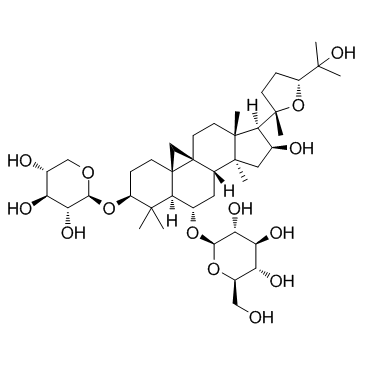 CAS#:83207-58-3
CAS#:83207-58-3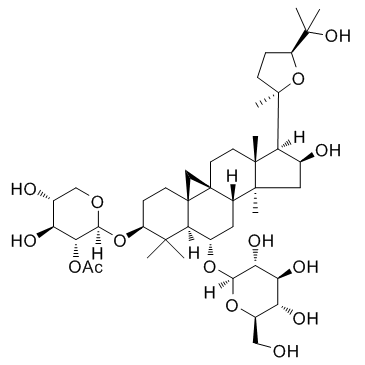 CAS#:84676-89-1
CAS#:84676-89-1 CAS#:86764-11-6
CAS#:86764-11-6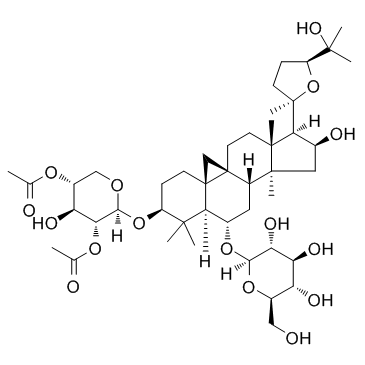 CAS#:84676-88-0
CAS#:84676-88-0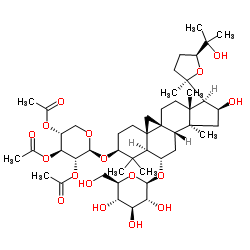 CAS#:84687-47-8
CAS#:84687-47-8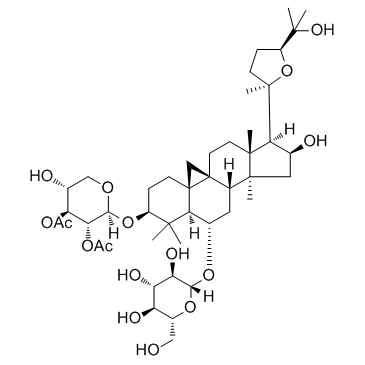 CAS#:84680-75-1
CAS#:84680-75-1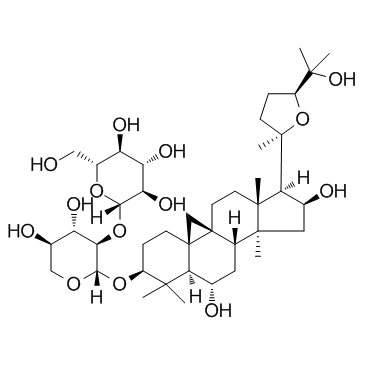 CAS#:84687-42-3
CAS#:84687-42-3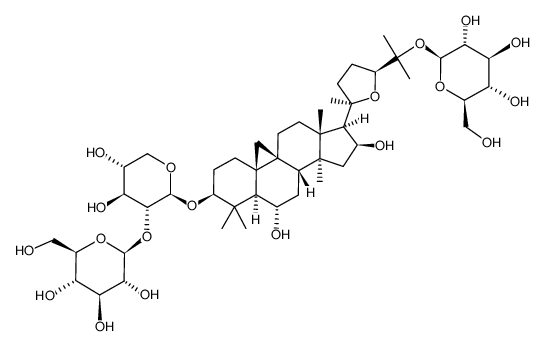 CAS#:84687-44-5
CAS#:84687-44-5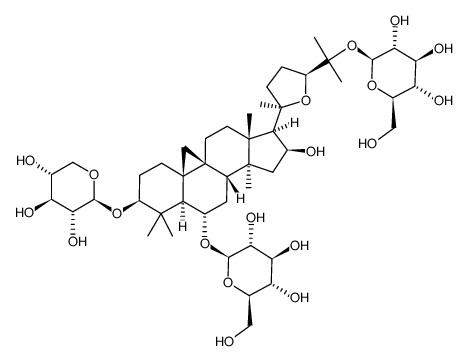 CAS#:84687-46-7
CAS#:84687-46-7
